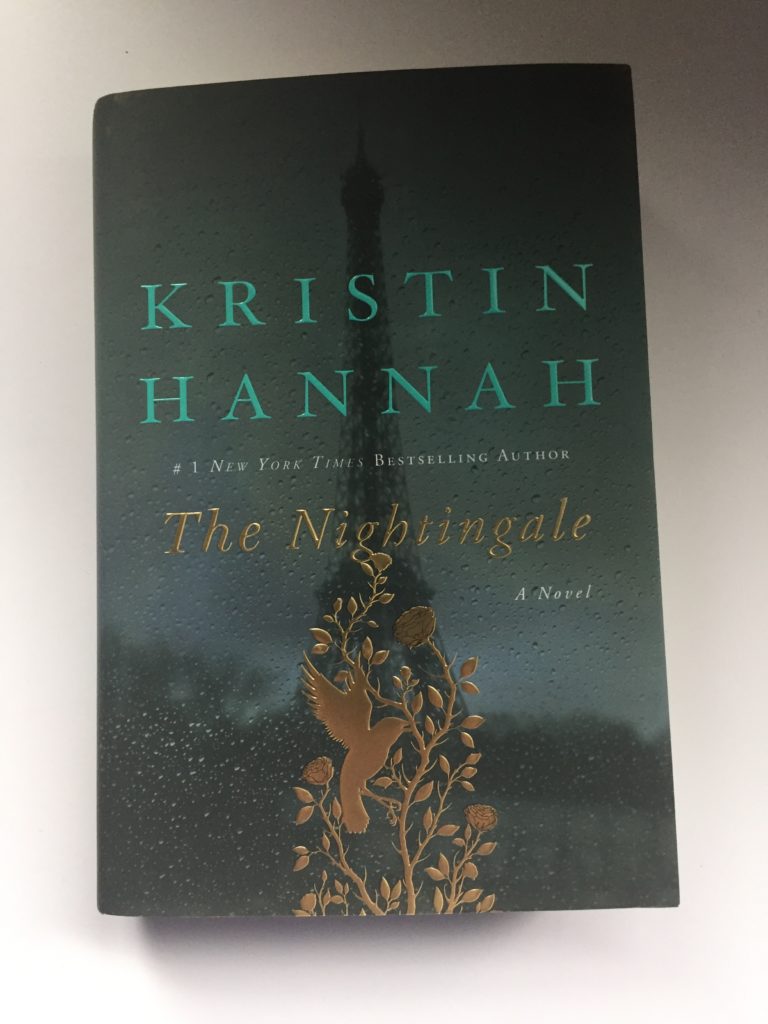Disclosure: SheSpeaks provided me with a complimentary copy of The Nightingale for this review. All opinions included in this post are mine.
When I think about the novels that resonate with me the most, I come back to two key elements: 1) a gripping story and 2) a relationship (or relationships) that connect the characters in a meaningful way. These are the books that I fall into, hiding myself away from my kids so I can continue to read, and books that I stay up way too late to get through “just one more chapter.” I’m always looking for the next book to read that has these two elements. I have recently finished a book that fits that bill, and I am pleased to recommend it to you.
 Earlier this month, I was sent a copy of “The Nightingale
Earlier this month, I was sent a copy of “The Nightingale” by Kristin Hannah to review, and as a previous reader of Ms. Hannah’s novels, I was looking forward to diving into her latest book (which is now out in paperback). The story opens in France in 1939, as the Nazis are marching across Europe. The reader meets two sisters, Vianne and Isabelle, whose relationship has been strained for some time. Vianne, married to Antoine and mother to a young daughter, Sophie, is making a life in a small house on the edge of a village in the Loire Valley. Antoine is soon drafted to fight for France, and Vianne is forced to find her inner strength, especially when German troops take over the town and day-to-day survival becomes difficult. Isabelle comes to live with Vianne and Sophie, but finds herself chaffing under the Nazis’ increasing restrictions and rules. She, too, leaves, to fight, though her journey is different from Antoine’s; Isabelle goes to Paris for a new life as a member of the Resistance. The book follows the sisters as they struggle to stay alive, keep the people they love alive, and find ways to connect with one another.
I’ve read enough about World War II to know the basic outline of “The Nightingale” — the food shortages, the concentration camps, the challenges Vianne would face when a German officer billets in her home, and the danger Isabelle would encounter as she fights against the Nazi occupation — but what drives the story forward (and had me reading way past my bedtime) is connection. The connections between the characters — between Vianne and Isabelle; Vianne and Sophie; Vianne and her best friend, Rachel; Isabelle and her father; Isabelle and Gaëtan, the man she loves — reminds the reader that our relationships and the love we have for one another are what sustains us, in peace and in war.
I do have one confession about “The Nightingale.” I read the last 15-20% of the book sitting by a hotel pool at Disney World; the sun was shining; my kids were splashing in the water; and I was sobbing. My seven-year-old daughter came up to me, perplexed. “Mama, why are you crying?” She was concerned, which was legitimate, as we were in the happiest place on Earth, after all.
“My book. I just finished my book. It made me cry,” I explained.
“Your book made you cry?” She was really confused.
“Yes, it was that good,” I answered. She gave up, shaking her head in confusion, and jumped back in the pool.
“The Nightingale” was so good. I appreciated Ms. Hannah’s smooth storytelling, her new take on an era that has been the subject of hundreds of novels, and her portrayal of the ways we find strength even in the worst of times.
Recommendation: “The Nightingale” is a great choice for if you who want to get swept up into a story that will stay with you some time after you turn the last page. It’s also a fit for readers who enjoy fiction set in the World War II era and/or are looking for a compelling story about relationships and sisterhood. If you finish “The Nightingale” and want more of Kristin Hannah’s writing, try “The Winter Garden” (and have some tissue nearby).
Rating: 4/5 stars

I can’t wait to get a copy !
I read “Winter Garden”—still think about it often.
Best to you, my friend.
Hope you enjoy the book, Moira! All my best to you!